 Leading Blog | Posts by Month |
 Leading Blog | Posts by Month |
05.31.25

LeadershipNow 140: May 2025 Compilation
See more on
Posted by Michael McKinney at 07:13 AM
05.29.25

Leading Thoughts for May 29, 2025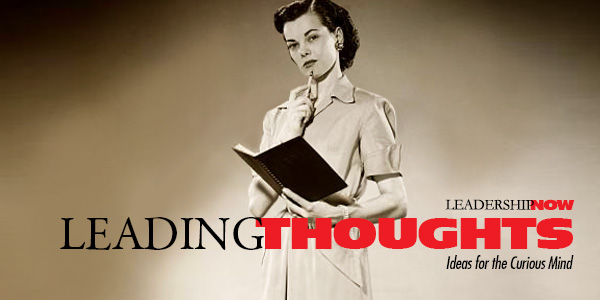
IDEAS shared have the power to expand perspectives, change thinking, and move lives. Here are two ideas for the curious mind to engage with: Rich Diviney on the notion of peak performance: “Repetitive peak performance is unrealistic because performance is often conditional. It typically requires a predictable and familiar environment. Repetitive peak performance is unrealistic because uncertainty is life’s foundational state. True success in life and business hinges instead on optimal performance, which means delivering your “best” in the moment, whatever your best looks like in that moment. However, sometimes your best is about persevering, moving forward step-by-step in the midst of challenges, embracing the messy, grueling, and unpolished reality.” Source: Masters of Uncertainty: The Navy SEAL Way to Turn Stress into Success for You and Your Team Robert E. Siegel on moving forward in a changing world: “Fully understanding the reasons for past successes can help you internalize whether your old ‘playbook’ is still useful for a current or future challenge.” Source: The Systems Leader: Mastering the Cross-Pressures That Make or Break Today’s Companies Look for these ideas every Thursday on the Leading Blog. Find more ideas on the LeadingThoughts index.
Posted by Michael McKinney at 03:09 PM
05.22.25

Leading Thoughts for May 22, 2025
IDEAS shared have the power to expand perspectives, change thinking, and move lives. Here are two ideas for the curious mind to engage with: Dan Thurmon on testing yourself: “When uncertainty and randomness strike, whether the immediate perception is threatening or exciting, you don’t take it personally. You simply see it as a new factor to incorporate into your life. This is not about the challenge coming at you. It’s about the challenge coming from you. It’s not what’s testing you, but how you are choosing to test yourself.” Source: Positive Chaos: Transform Crisis into Clarity and Advantage Dean Williams on helping people face challenges: “The first challenge of leadership is to get people to wake up to the fact there is a problem—that the group is avoiding some aspect of reality, ignoring a threat, or missing a great opportunity. To get the people to wake up and face the problem is an activist challenge. Often the problem is embedded in people’s values and behavior. The people might espouse one view but act in ways that are not consistent with that view. The leadership task in an activist challenge is to call attention to the contradiction in values and intervene to disrupt the thinking and patterns of behavior that allow the people to persist in avoiding the reality of their condition.” Source: Real Leadership: Helping People and Organizations Face Their Toughest Challenges Look for these ideas every Thursday on the Leading Blog. Find more ideas on the LeadingThoughts index.
Posted by Michael McKinney at 03:05 PM
05.21.25

Productive Failure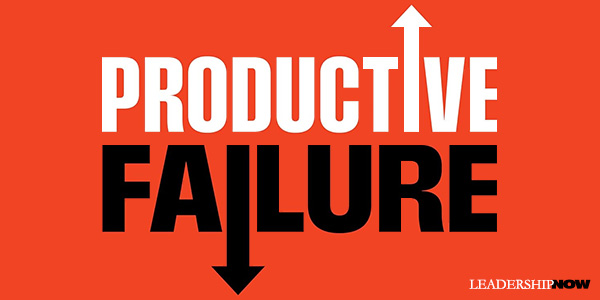
HOW do people learn? Simply put, when the reality does not meet the expectation. When we make mistakes. When we fail. And when we learn from those mistakes, we learn not only the correct way to go, but we gain a deeper understanding of the issue and thus are able to more easily apply it to similar situations. In other words, if we try to solve the problem before we are told how to do it, we learn better. Manu Kapur wrote Productive Failure with this in mind. “The idea of Productive Failure is to be proactive; that is, if failure is so powerful for learning, then we should not wait for it to happen. We should intentionally design for it for deep learning.” Kapur began his career as a math teacher. He thought “if he could engage his students, explain the concepts as clearly as possible, then show them, step-by-step, exactly what to do and how to do it, he’d achieve transformational results.” This is the direct instruction method that we are all accustomed to—the teacher lectures, we practice, and we learn. It feels right. It feels logical. However, the problem with the direct instruction method is that while we feel we’ve learned, our understanding is often largely superficial. “The problem was not that we learn poorly from bad lectures, but rather that we learn poorly from excellent ones. Not learning well from bad lectures is understandable and explainable. Not learning well from good lectures is perplexing, even shocking.” The solution to the paradox lies in realizing that the first job of teaching is actually not to teach. The first job of teaching is to prepare the novice to see with an expert’s eyes. In contrast to Direct Instruction, Discovery Learning asks the learner to figure out how to apply their existing knowledge to the problem first. “Discovery Learning emphasizes active engagement and self-exploration as the primary drivers of acquiring new knowledge.” Discover Learning asks you to transfer your existing knowledge to new contexts. Activating prior knowledge helps us to make sense of new information. It develops curiosity and open-mindedness. This kind of learning is the most valuable in dynamic and uncertain environments, and what we need more of in people at all levels. “Struggling a bit with the problem helps you learn better than if someone just explains the answers. Before we can repair or resolve our misconceptions or failures, we need to become aware of them in the first place.” An awareness of all we do not know is the beginning of knowledge and wisdom. The gap between what we know and what we don’t know sets us up to learn. So, how do we use this? As in teaching, as leaders and mentors, we can learn from this: “We are quick to see what is wrong in students’ answers and reasoning. We are quick to zone in on that which is incorrect, so that we can quickly and robustly correct it. What we are not good at is analyzing students’ incorrect answers to see if there are elements in those answers, bits and pieces, and components, that could be used as building blocks for helping them learn the correct concept.” What is right in the wrong answer? “Deep understanding requires that we are able to see what is critical and connect it with our prior knowledge.” Productive Failure helps us to reassemble components in our knowledge in a new way to solve new and harder problems. Tasks can be designed to be challenging and accessible. “Productive Failure is good for learning things that you need to deeply understand and transfer to novel situations,” like the adaptive challenges we face today. We are not trying to design for failure for failure's sake, but to design in such a way that we have to think through the challenge and see it in different ways. 
Posted by Michael McKinney at 05:13 PM
05.15.25

Leading Thoughts for May 15, 2025
IDEAS shared have the power to expand perspectives, change thinking, and move lives. Here are two ideas for the curious mind to engage with: Nick Bare on intentionality: “Lack of intentionality leads to a repetition of what is easiest.” Source: Go One More: Find the Clarity to Make Intentional, Life-Changing Choices Will Guidara on a point of view: “If you try to be all things to all people, it’s proof that you don’t have a point of view—and if you want to make an impact, you need to have a point of view.” Source: Unreasonable Hospitality: The Remarkable Power of Giving People More Than They Expect Look for these ideas every Thursday on the Leading Blog. Find more ideas on the LeadingThoughts index.
Posted by Michael McKinney at 10:34 AM
05.08.25

Leading Thoughts for May 8, 2025
IDEAS shared have the power to expand perspectives, change thinking, and move lives. Here are two ideas for the curious mind to engage with: Sébastien Page on focusing on what makes us better: “Traditional goals focus on outcomes, while mastery goals focus on process. Both are effective. It’s important to set goals for process improvements. Don’t overemphasize outcomes over process. If you don’t examine your process and the quality of your decisions, in other words, if you only focus on outcomes, you may think you’re an absolute genius. As a leader, recognize that attaining your goal does not necessarily mean you’ve made good decisions along the way.” Bob Rosen on finding our way forward: “Many of us live in a world of delusion, a kind of psychological avoidance. We avoid the mirror at all costs, and we do this to avoid discomfort and anxiety. Our natural tendency is to look outside ourselves for answers to life’s problems. In a counterintuitive way, our peace of mind really comes from the inside. Indeed, many of our problems are self-imposed, and the only way to put an end to our suffering is to deepen our self-understanding. By turning inward, we can find true joy and freedom. Otherwise, we are left with faulty thinking and disturbing emotions and the attachments that weigh us down.” Source: Detach: Ditch Your Baggage to Live a More Fulfilling Life Look for these ideas every Thursday on the Leading Blog. Find more ideas on the LeadingThoughts index.
Posted by Michael McKinney at 04:13 PM
05.01.25

Leading Thoughts for May 1, 2025
IDEAS shared have the power to expand perspectives, change thinking, and move lives. Here are two ideas for the curious mind to engage with: Richard Boyatzis and Annie McKee on prisons of our own making: “When we are in a downward emotional spiral, feeling confused, unhappy, or ill at ease, we often end up playing and replaying mental ‘tapes’ that actually accentuate our negative emotions and feelings of hopelessness. When we are feeling down over a long period of time, this self-talk centers on messages that undermine us and, in turn, our power to change bad situations (‘It’s not my fault’ ‘My life will never be really happy’) or messages that weaken our sense of efficacy (‘This situation is beyond my control, I’m just stuck with it’). Jonathan Brill on random change: “There are two interrelated reasons that you can control and profit from randomness. The first is that what’s unpredictable at one scale is often quite reliable at another. The second is that while random changes occur, they often self-organize into a reliable result.” Source: Rogue Waves: Future-Proof Your Business to Survive and Profit from Radical Change Look for these ideas every Thursday on the Leading Blog. Find more ideas on the LeadingThoughts index.
Posted by Michael McKinney at 12:24 PM

First Look: Leadership Books for May 2025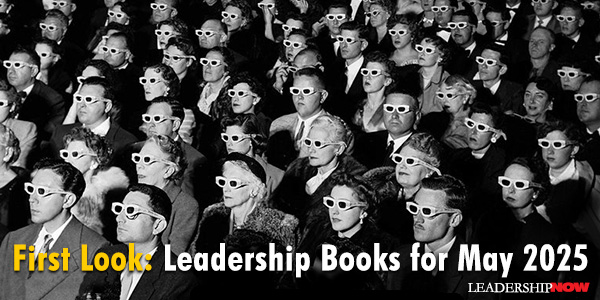
HERE'S A LOOK at some of the best leadership books to be released in May 2025 curated just for you. Be sure to check out the other great titles being offered this month.
Dave Whorton went on a journey to find a better way to build companies, a way focused on long-term stability and steady growth, funded through profitability; a way in which leaders were committed to a purpose beyond personal wealth generation, to putting their people first, and to setting up their companies to endure. He calls these companies "Evergreen." Another Way combines Whorton's inspiring story with his Evergreen 7Ps framework, designed to guide more entrepreneurs and business leaders to follow his path. Full of revelations, practical advice, and real-world examples of companies going Evergreen, Another Way is as instructive as it is inspiring at showing capitalism at its best.
Increasingly, people report feeling overlooked, ignored, and underappreciated at work. Simply put, they don't feel like they matter to their leaders or organizations—and it's taking a toll. This hidden epidemic of insignificance is fueling a mental health crisis, intensifying loneliness, and, for organizations, driving disengagement, turnover, and low performance. Zach Mercurio reveals how mattering to others is a fundamental—yet often overlooked—requirement for thriving. He introduces a simple yet effective framework for making daily interactions with your people more meaningful: Noticing: the practice of seeing and hearing others, Affirming: the practice of showing people how their unique gifts make a difference, and Needing: the practice of showing people they're relied on and indispensable
How to measure a life? After a career of service, retired four-star general Stanley McChrystal had much to contemplate. He pondered his successes and failures, his beliefs and aspirations, and asked himself, Who am I, really? And more importantly, who have I become? When I die, how will I be measured? In the end, McChrystal came to a conclusion as simple as it was profound: the reality of who we are cannot be recorded in dates or accomplishments. It is found in our character—the most accurate, and last full measure, of who we choose to be. On Character offers McChrystal’s blueprint for living with purpose and integrity, challenging us to examine not just our deeds but who we become through them.
An inspiring, practical book by Gui Loureiro, Regional CEO overseeing Walmex, Walmart Canada, and Walmart Chile, and his executive leadership coach Carlos Marin that shows how even the most successful leaders must be open to personal change in order to transform their company. Reinventing the Leader is the turbulent story of how it happened that’s especially relevant in this age of globalization. Gui learns from Carlos that to change the company he must first transform his own leadership style. Written from the dual perspectives of a CEO and his leadership coach, this candid book provides an insightful blueprint for any organization’s success. Today’s leaders are expected to inspire by sharing a vision based on purpose, not just profits. Loureiro and Marin’s enlightening account of self-discovery and business reinvention defines a fresh new approach to leadership for the future.
From Jon Gordon comes a powerful new fable on what it takes to build a truly great team. Through engaging storytelling, real-world lessons, and actionable insights, Gordon reveals the seven commitments that great teams must make to build trust, foster connection, overcome adversity, and achieve extraordinary success. Whether you're a business leader, coach, entrepreneur, or team member, this book will inspire you to commit, lead with purpose, and build a team that wins, thrives, and leaves a lasting impact.
In The Optimist, the Wall Street Journal reporter Keach Hagey presents the most detailed account yet of Altman’s rise, from his precocious childhood in St. Louis to his first, failed startup experience; his time as legendary entrepreneur Paul Graham’s protégé and successor as head of Y Combinator, the start-up accelerator where Altman became the premier power broker in Silicon Valley; the founding of OpenAI and his recruitment of a small yet superior team; and his struggle to keep his company at the cutting edge while fending off determined rivals, including Elon Musk, a former friend and now Altman’s bitter opponent. Hagey delivers a nuanced, balanced, revelatory account of the individual who is leading us into what he himself has called “the intelligence age.” Altman is a figure out of Isaac Asimov or Neal Stephenson. Or he is the author himself: if it feels as though we have all collectively stepped into a science fiction short story, it is Altman who is writing it.
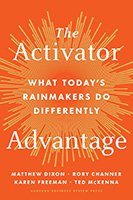 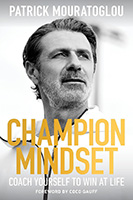 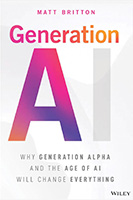 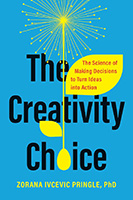
“You can't think well without writing well, and you can't write well without reading well. And I mean that last "well" in both senses. You have to be good at reading, and read good things.” — Paul Graham, Y Combinator co-founder
Posted by Michael McKinney at 07:35 AM
|
BUILD YOUR KNOWLEDGE


How to Do Your Start-Up Right STRAIGHT TALK FOR START-UPS 
Grow Your Leadership Skills NEW AND UPCOMING LEADERSHIP BOOKS 
Leadership Minute BITE-SIZE CONCEPTS YOU CAN CHEW ON 
Classic Leadership Books BOOKS TO READ BEFORE YOU LEAD |
|